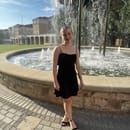I have always loved reading and writing. I remember how, when I was younger, I would spend hours in my room or outside reading tantalizing tales and writing my own stories. I had entire baskets that were overflowing with exciting books and countless colorful folders that were bursting with pages of wild, imaginative stories. I was obsessed with the idea that I could create my own worlds and fill them with bold, unique characters using mere paper and ink.
My love for reading and writing grew with time, blossoming into an enthusiasm for words, syntax, rhetoric, and the concept of language itself. In high school, I took any opportunity I could to research and write about how language influences thought and culture and vice versa; I wrote papers that discussed the impact of technology on language, language’s effect on people’s reception of information and participation in politics, and the role language plays in theological discussion. My senior thesis focused on the relationship between culture, language, and theology; in it, I investigated how the customs, traditions, and modes of communication of a given time shape the way we think about and know God.
I have also grown to deeply appreciate the function of grammar and punctuation — two concepts that first frustrated and confused me but now inspire a sense of awe and wonder within me. It astounds me how much punch a small dot packs: one tiny, seemingly insignificant colon, comma, semicolon, or EM dash can change the entire meaning of a sentence and thereby alter the meaning of reality itself (as it is with language that we construct our realities). I love the creative liberty that punctuation equips you with: you can use punctuation to form different, unique sentence structures and to write in inventive ways that you may have never conceived.
One of my favorite quotes (which I even have printed on a small leather journal) comes from the American novelist and literary critic William H. Gass: “The true alchemists do not change lead into gold; they change the world into words.” I love these writer’s words deeply; I cannot imagine a sentiment that could better express the magic of words, which transform our feelings — those elusive, near-ineffable sensations — and all that we perceive into a common unit of exchange. Language binds us; it allows us to form and deepen relationships, to participate in a reality that language equips us to shape together, and to understand each other and the unique ways in which we all see the world.
Language does not receive enough credit; it has become something we take advantage of, something that we rarely think about. Language gives us the agency to mold our relationships, experiences, and beliefs; it also imprisons us, trapping us within the limitations of our own words. It is vital that we are conscious of the effect language has on our perception; if we are oblivious to its influence, then we risk becoming stuck in old, familiar patterns of thought, unquestioningly accepting conventions our predecessors handed down to us. And if we become ensnared in familiar patterns, never challenging previous ways of thinking, then we will never gain a real, deep understanding of anything; we will never make innovations, and we will never expand the borders of our minds.


